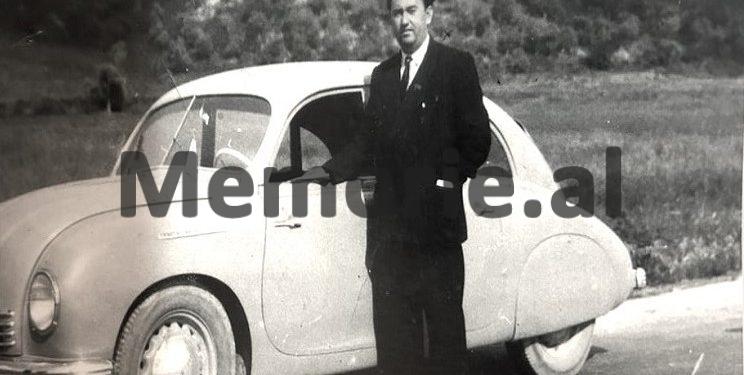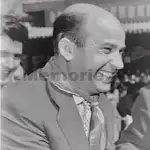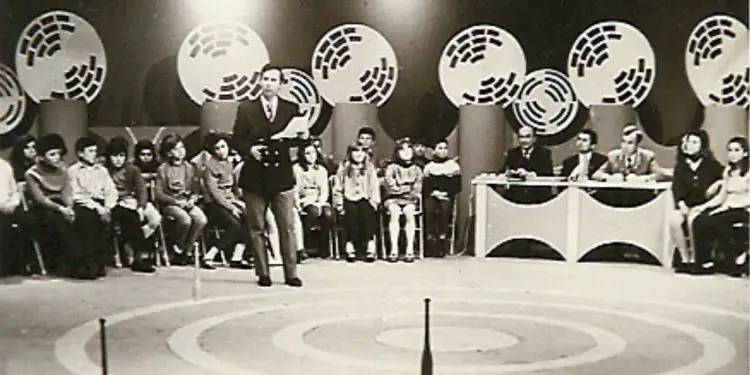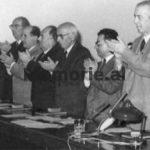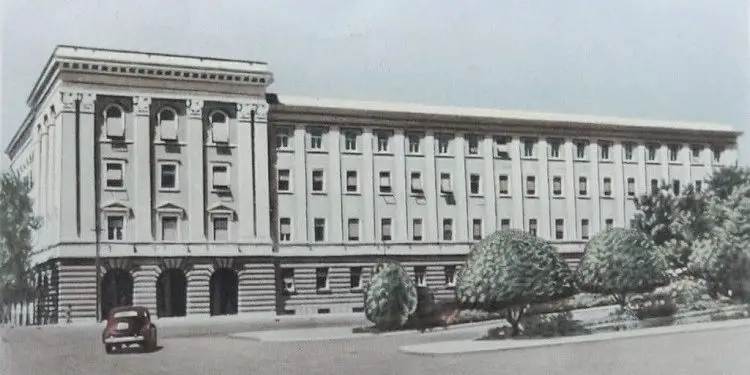From Skifter Kelliçi
The fifth part
Prologue
Memorie.al / It are the fourth time that I am writing about the 11th National Song Festival on Albanian Radio Television, (December 22-25, 1972), as much as I wrote some time ago about the Tirana Conference, (16- April 20, 1956). And this time for the same reason: for the lack of historical accuracy of some events related to this festival, which Ramiz Alia, the former first secretary of PPSh, after the death of Enver Hoxha, describes in the book his last “My Life” (2010), although there are objective, honest statements in it, especially when he testifies about the serious mistakes that led to the failure of the communist system in Albania, led by Enver Hoxha, for which he apologizes. But in the description of his figure, Ramiz Alia is often contradictory, especially in the chapter; “The fight against liberalism”, where it stops at the 11th Song Festival on Albanian Radio and Television (December 22-25, 1972).
Continues from last issue
Enver Hoxha starts the attack…!
March 15, 1973. At the general meeting of the communists of the Central Committee of the Party, for accountability and elections, Enver Hoxha gave a harsh speech, where he openly attacked Fadil Paçram. “These friends,” he said among others, “want us to affirm that liberalism is not the main enemy.” This is the thesis of the enemy. We ask the question: Are you with the theses of the Party, or with the theses of the enemy? (Enver Hoxha, work 50, page 297, 1986). Let’s analyze this expression carefully. So, these friends (that is, Fadil Paçrami and Todi Lubonja), oppose us, telling us with their activity, that liberalism is not as dangerous as conservatism.
(And Fadili had shown this with his tendencies to replace, at least in the field of art, elements with seniority, even with experience, with new elements, as he did, if we take a simple example, in the State Ensemble of Folk Songs and Dances, where some artists and artists forced them to leave the stage). He was wrong. He had nicknamed the “Migjeni” Theater, the “Bogdani” Theater, because he was somewhat behind the times…! But with mistakes like this, did Paçrami want to impose his liberal tendencies on the Party, so much as to force Enver Hoxha to affirm that this is the thesis of the enemy? So it turns out that he is an enemy, as he announced a little later? Lies!
Enver Hoxha was looking for heads to cut off and invented such paradoxical situations. As a result, Fadil Paçrami, like many others, who had interrupted his higher studies in Italy, who had joined the partisans in the mountains, had fought, who had put his head in danger, he, after the war, had been appointed to positions of high up in the government and the party, who had also become a member of the Central Committee of the Party… turned into an enemy for him… with the so-called liberal actions! Let’s assume that this was true, but for these actions, he could be dismissed from the Tirana District Party secretary, remain a simple communist and work somewhere, even as a teacher, editor, or literary proofreader…!
Even that would be difficult. But only Enver Hoxha could do such absurd actions. But it is known that he had been targeting Fadil Paçram for years, and had even drawn his attention to the fact that he was more concerned with his literary works, when he should have devoted more to party affairs, remarks which “…Fadili, – as asserts Marash Hayati, in his book, “The back door of the press”, he had received them with indifference”. (page 80).
As far as I remember, at that time, when he was criticized because, as party secretary, who also covered art and culture, he should have been responsible for the 11th Festival, he replied that; The RTS depended on the Press Directorate and not on the Tirana Party Committee. So, indirectly, according to his assertion, the responsibility fell on the Central Committee, which was led…, by Enver Hoxha himself! And if that’s the case, then he’s been outspoken again, that he’s telling the truth. Of course, the dictator could not overcome this.
It is also known that he had called him to the office, where Hysni Kapo was by his side and had talked with him. And Fadili had made a self-criticism, taking out a pad from his pocket, where he had noted the main points of this self-criticism. But this did not please “our great leader”.
Necessarily, Paçram had to come up with a multi-faceted self-criticism, in which to crush himself and, perhaps, even this would not be enough for the dictator, as Mehmet Shehu’s 25-page self-criticism had not been later, where even if had called himself garbage, this would probably not satisfy Enver Hoxha. And the dictator thus launched the frontal attack on Fadil Pachrami.
Let’s go back to the meeting, based again on Marash Hayati’s book, “The back door of the press: “In the so-called meeting – he writes, – there was nothing else, neither reports, nor discussions. In fact, no one was asked to ask questions or clarify. There was only silence. And this silence was broken by the manly rise of Fadil Paçrami and his departure from the hall”. (page 80). It is understandable that the question: “Are you with the theses of the Party or with the theses of the enemy”? Was also addressed to Todi Lubonja. This is how Enver Hoxha’s attack on him began.
“I too, – he writes in the book “My Life”, – found myself in a difficult position. I was the secretary of the Committee
Central of PPSh and responsible for the field of propaganda and culture. So the criticisms were directly related to my activity. I must say that at the beginning, I did not think that this “campaign” would have the consequences it did, especially for some friends, such as Todi Lubonja, or Fadil Paçram. I can’t say that I was against the discussions that took place, but I didn’t like some exaggerations that were noticed, especially when some of the “critics” were known as people without character, or without culture. However, I too, although without much enthusiasm, got involved in this front of the ideological war”. (page 264).
Really late but honest confession. So Ramiz Alia accepts what Todi Luboja told me, when during the visit to Dajti Mountain, from the first ten days of March 1973, as I wrote above, he tried to calm him down, explaining that Enver Hoxha’s criticism of the Festival of The 11th, and they would go no further. But the opposite happened…!
Open attack against Todi Lubonja in RTSh
In the last week of March of that year, on a gloomy morning, in the big hall of the Radio-Television Orchestra, the general meeting of the party organizations of Internal Radio, External Radio, Television, technical sector and RTS administration, with about 100 communists. The order of the day, it was known: More or less the mistakes of Todi Lubonja, especially in the organization of the 11th Festival.
Together with two friends, editors, we crossed the bridge that connects the TV building with the Radio building and stayed for a moment in the middle of the third floor, from the windows of which, the inner courtyard of the Radio can be seen. What impressed us was only that two delegates from the Central Committee of the Party had come to participate in this meeting, but because they, as a communist comrade told us under his breath, at the entrance to the large orchestra hall symphony of the Radio, where the meeting was to take place, the communists stopped and gave them this order: “In your discussions, distinguish between Nefo Mufti and Todi Lubonja, who is responsible for everything that happens at the festival”!
Actually, it was not like that: as is known, it is the directorate of Radio Tirana, from which the Orchestra also depends, which deals with the organization of the festival, from the appointment of a commission for the selection of songs, the editing of texts, the director… and everything else. Of course, the general director also gives the appropriate guidelines, which were then taken directly by the Central Committee. And in this case, Todi Lubonja, as he told me in our meetings, had given orders mainly for the festival to be permeated by even livelier songs, with more striking lyrics, so that it felt like we were in a pleasant song show , in short, to make an even bigger leap, in raising its artistic quality. And he had received these orders from the propaganda directorate of the Central Committee, which was headed by Pirro Kondi and, of course, by Ramiz Alia, both of whom were his comrades in arms.
However, with these orders of the Central Committee members, who participated in that meeting, it is understood that Nefoja, as the wife of Manush Mufti, a member of the Political Bureau, would not be hit like Todi Lubonja. “We, the communists,” said the friend who participated in that meeting, “we were forced to direct all the arrows of our harsh criticism towards Todi Lubonja.” But, to be honest, with the exception of some careerist element, we didn’t feel like criticizing Todi Lubonja.
We understood that with the 11th Festival, Enver Hoxha was deliberately and tendentiously exaggerating. But we had nothing to keep. And Todi Lubonja, in his discussion, took all the responsibilities on his shoulders, even to relieve Nefo, with whom he had a very cordial relationship”. In the breaks between meetings. I saw Todd, pensive, alone, and sitting on a long bench, where orchestra players usually sat. What was he thinking?! He knew that he would leave RTSh, but how would this ordeal end?!
The month of April came. In its first days, there was a meeting of the Television team. This time, Todi Lubonja faced us, editors, engineers, technicians. I, in those days, had started the creative leave and was working in the State Archives, to collect materials for the novel “The Paris Attacks”, which was published in 1978. I did not want to be in that meeting, but I went there, because something was needed to take you to the office and I happened to be in only one session. There I saw that the employees were really criticizing the festival and Todi Lubonjë who was sitting at the end of the large recording hall at Television.
But no milk. Even the secretary of the party. There was also an editor who took the courage to say something, as if to defend Todd. He would have followed him later, but another friend came to his defense, which had warm arms, and he, without starting a storm, found a place to work in a magazine. When this session was over, I took a chance and left. And I was justified, as I said I was under creative license. But my friends told me that Todi Lubonja had discussed briefly, as in the meeting of the party organization, Albanian Radio-Television.
Back to the tracks of the old road
After a few days, on the morning of April 11, 1973, when, although with creative leave, I again had to go to Radio-Telvizion for a job. As soon as I entered the building, a group of friends said to me, who could before: – “Do you know who our director has been appointed?” – “No”! – “Thanas Nano”! I was stunned, just like they were when they heard this wonder.
We had judged everything, we had thought of a lot of talented people with horizons, who could be assigned to this task, but never to return… Thanas Nano, nominated by the Party, with the mouth of Manush Mufti, in a way in another, as; conservative, in that meeting I wrote about above and that had to be replaced, with a director with more horizons.
But rather I am quoting again, what Marash Hayati writes in his book; “The back door of the press”, who at that time was a press instructor at the Central Committee and a year later, in August 1973, he would be appointed director of the RTS, and then its general director: ” First of all, the appointment of the director general was urgently required. Searches for possible candidacies followed an unprecedented ‘marathon’ of offices. Under the direction of the two secretaries of the Central Committee, many files were browsed, many characteristics were drawn up and the final report was formulated.
The help of our press sector, for the chosen one in the post of the future director of RTS, was modest, only giving an opinion, if he could master that task, in the field of journalism. The material, complete with a number of candidacies, where the names of personalities, such as members of the Central Committee, of the government, heads of departments, etc., were listed, was presented to Enver Hoxha, who, after studying it carefully, made approximately the following note on the material:
“On the radio, Thanas would return. In the professional field, we may have shortcomings, but something like Todi’s will not do”, Signature, Enver Hoxha. This sudden return to the “tracks” of the old road was a disregard for all this voluminous work that was done to bring at least a new figure to the head of Radio-Television. However, Enver Hoxha accepted other experiments after what had happened”?! (page 81).
He continued in the tradition of a dictator who asks no one’s opinion and denies anyone’s opinion. Wasn’t he, as we saw above, the one who ordered the theatrical pieces; “The White Circle” and “The Dark Spots” should not be shown because of ideological mistakes, when Prime Minister Mehmet Shehu had described the second drama as excellent in dealing with social problems?! Wasn’t he, since Ramiz Alia, jokingly said about his songs, only the words; “Aren’t these candies covered in sugar that contain poison”?!, (Todi Lubonja, “Under the weight of violence”, 2010, pages 303, 304), and he didn’t like it for a long time, was silent!
Hadn’t Mehmet Shehu and Hysni Kapo been, as Ramiz Alia writes in his book; “My life”, since the day after the end of the festival, that they had not made the slightest remark, and after this silence, Enver Hoxha was plotting this whole war against him, with consequences that were not yet known what they would be?!
Already, in the above case, he, with one drop of the pencil, trampled through a whole list of candidates for the vacant position of general director of RTSh, approved by two secretaries of the Central Committee, one of whom it was again, surely, Ramiz Alia and the other, perhaps, Hysni Kapo, to bring back… Thanas Nanon, in the direction of RTSh!
Did not the judgments of the secretary of the Party Committee of the district of Tirana, Manush Myftiu and the vice-chairman of the Council of Ministers, Xhafer Spahiu, who presented Todi Lubonjen to the RTS collective, with a new vision and thinking, replacing Thanas Nanon, who did not adapt to the rapid developments of the time? (Whereas Ramiz Alia, we remember once again in his book; “My Life”, he writes that; Enver Hoxha “listened to his friends and made collegial decisions”!?).
Then, wasn’t he the one who, in his speeches, emphasized that we had to fight equally, both conservatism and liberalism, as two fierce enemies of the socialist society?
Then, if he called Todi Lubonjë a liberal, how did he return the conservative Thanas Nano to the RTS?! And aware that from the professional side “we may have shortcomings”. So, he recognized his limited abilities, but the problem was that; “things” like Todd’s, wouldn’t he allow?!
For Enver Hoxha, this was the most important, the others did not matter. That the RTSh might not have improvements from the artistic side, this did not seem to bother him. The desolate Albanians, who with hard savings, could barely afford to buy a television that cost 4,500 ALL (new), when their average monthly salary was about 500 ALL, only the above things of Todd not to see?!/ Memorie.al
The next issue follows




